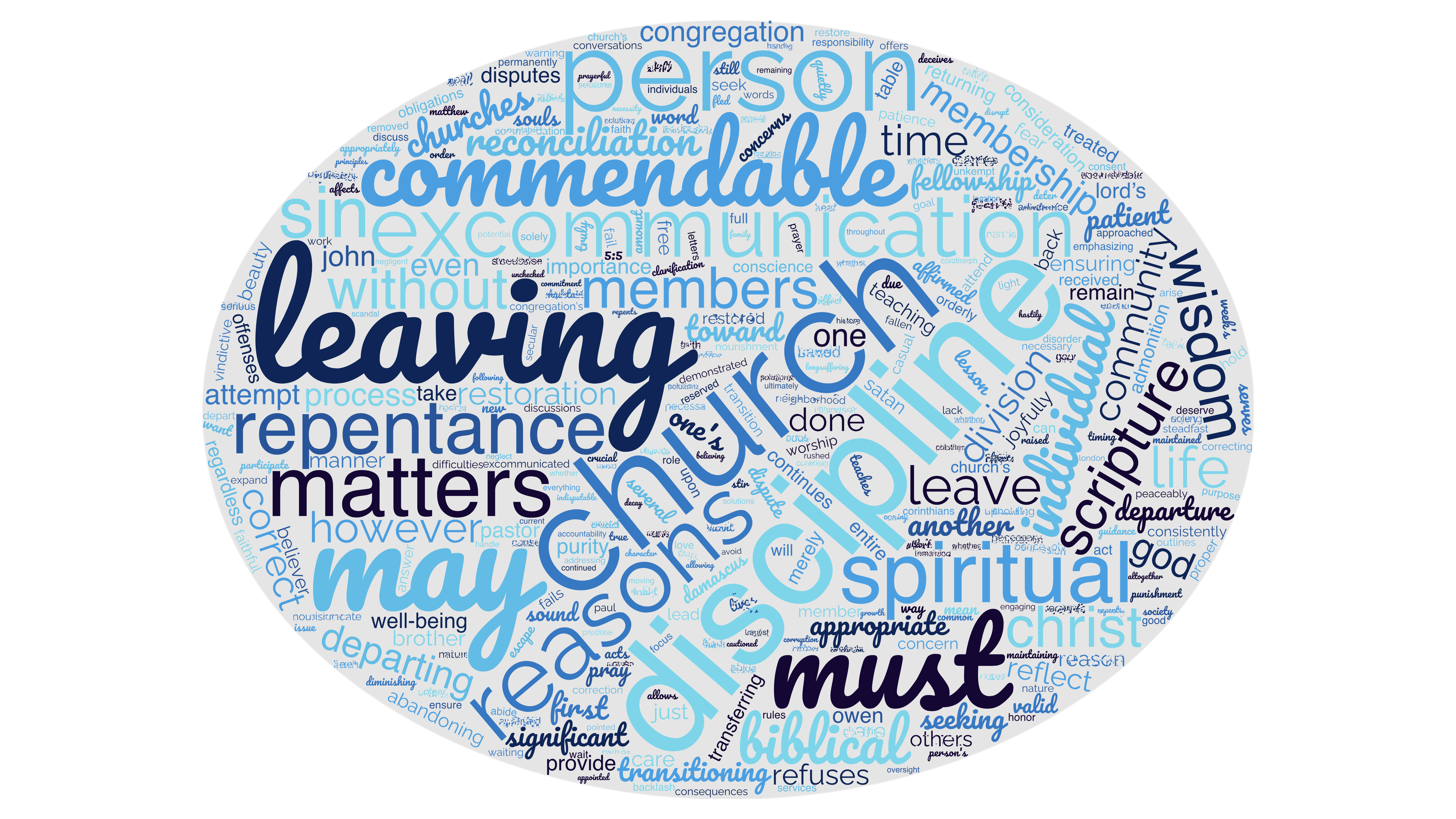The Importance of Church Discipline and Leaving a Church for Commendable Reasons

Clarifying Church Discipline and Excommunication
Today, we will discuss commendable reasons for leaving a church. However, before we do so, I want to expand on last week’s lesson on excommunication. Several questions were raised that deserve further clarification.
One crucial question is: Is there any sin that permanently prevents a person from returning to the church?
The answer is no. Any sin that is truly repented of allows a person to be restored to church membership. However, the process of restoration may take time, as repentance must be demonstrated through one’s life, not merely through words. This requires wisdom and patient waiting on the Lord’s appointed time for restoration.
Excommunication is not meant to destroy a person but to correct and ultimately restore them. The goal is not vindictive punishment but spiritual healing. As Scripture teaches, the church hands an individual over to Satan so that their soul may be saved (1 Corinthians 5:5). Even after excommunication, the church continues to pray for that person’s repentance and restoration.
The Role of Discipline in Maintaining the Church’s Purity
Just as an orderly society has rules, so must the church. If a person refuses to abide by the laws of Christ, they must be removed from the community. Without discipline, disorder and corruption take hold, diminishing the church’s spiritual beauty. Just as an unkempt house in a neighborhood affects the entire community, unchecked sin in the church can lead to division and spiritual decay.
Even after excommunication, we still have obligations toward the individual. We pray for their repentance, but we must also avoid fellowship with them in both private and public matters. While they may attend church services to hear the Word, they are not to partake in the Lord’s Table or participate in the life of the church as a member.
John Owen rightly pointed out that while an excommunicated person may listen to the Word, they should not be treated as a brother or sister in Christ. Conversations with them should focus solely on spiritual matters, urging them toward repentance rather than engaging in casual or secular discussions.
The Process and Purpose of Excommunication
Excommunication is reserved for significant, unrepentant sin—those matters that are indisputable by Scripture or the light of nature. It is not for minor disputes. The church must remain steadfast in upholding biblical discipline regardless of the potential backlash or difficulties that may arise. Fear of consequences should never deter us from following Scripture.
Church discipline serves both the church and the individual. A lack of discipline deceives individuals into believing they are saved when their lives do not reflect true faith. Churches that neglect discipline fail in their responsibility to lead souls toward repentance and reconciliation with God.
The Importance of Time and Patience in Church Discipline
A common concern is the timing between admonition and excommunication. Matthew 18 outlines a process, but this does not mean discipline should be rushed. John Owen cautioned against hastily moving from warning to excommunication, emphasizing that a significant amount of time should be given for repentance. God is patient and longsuffering with us, and we should reflect His character in our dealings with others.
When a person repents, they should be received back joyfully and with love. Their repentance should be publicly affirmed before the church, and through the congregation’s consent, they should be restored to full fellowship.
Commendable Reasons for Leaving a Church
Leaving a church should be done with prayerful consideration and for valid reasons. Some commendable reasons include:
- Matters of Conscience – If remaining in a church would require a person to sin against their conscience, leaving may be necessary.
- Persecution – As Paul fled Damascus for his safety (Acts 9:23-25), it is appropriate to leave if one’s life or well-being is in danger.
- Livelihood and Necessity – If a person cannot provide for his family in his current location and must relocate for work, this is a valid reason to leave.
- Edification and Spiritual Growth – If a church consistently fails to provide sound biblical teaching and refuses to correct this when approached, seeking a church that offers proper spiritual nourishment is appropriate.
However, before leaving, one must first attempt to resolve the issue. A church member should communicate concerns with the elders and seek solutions. Leaving without first addressing these matters is not commendable.
Leaving in a Commendable Manner
If one must leave, it should be done in a commendable way:
- Free from Scandal – Departure should not be an escape from church discipline or correction.
- Without Causing Division – A person should not attempt to stir discord or persuade others to leave with them. They should depart quietly and peaceably.
- Seeking Reconciliation – If a dispute is the reason for leaving, reconciliation should be pursued before departure.
The 1689 London Baptist Confession (Chapter 26, Paragraph 13) emphasizes that church members should not disrupt church order or withdraw from worship due to personal offenses but should wait upon Christ and the church’s leadership to handle disputes appropriately.
Transitioning to Another Church
Leaving a church should not mean abandoning church life altogether. A believer should transition to another faithful church, ensuring continued accountability and spiritual care. Throughout history, churches maintained this practice by issuing letters of commendation for departing members, ensuring they were received into another congregation in good standing.
A pastor is accountable for the souls in his care. Allowing members to leave without guidance or concern for their spiritual well-being is negligent. A pastor should ensure that departing members are transferring to a sound church where they will be shepherded and remain under biblical oversight.
Conclusion
Church membership is a serious commitment. Discipline, excommunication, and even the act of leaving a church should all be handled with prayer, wisdom, and adherence to biblical principles. Whether correcting sin, restoring a fallen brother, or transitioning to a new congregation, everything should be done in a manner that glorifies Christ and preserves the purity of His church.
May the Lord grant us wisdom and humility as we seek to honor Him in these matters.



Leave a Reply